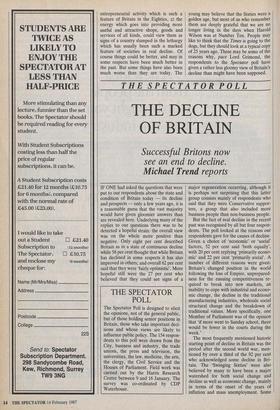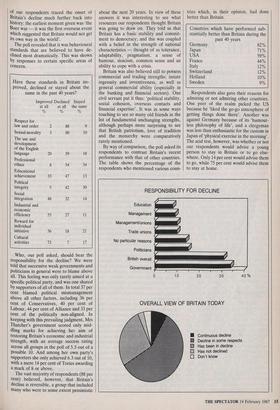THE SPECTATOR POLL
THE DECLINE OF BRITAIN
Successful Britons now see an end to decline.
Michael Trend reports IF ONE had asked the questions that were put to our respondents about the state and condition of Britain today — its decline and prospects — only a few years ago, it is a reasonable guess that the vast majority would have given gloomier answers than are revealed here. Underlying many of the replies to our questions there was to be detected a hopeful strain: the overall view was on the whole more positive than negative. Only eight per cent described Britain as in a state of continuous decline while 58 per cent thought that while Britain has declined in some respects it has also improved in others; and overall 62 per cent said that they were 'fairly optimistic'. More hopeful still were the 27 per cent who believed that they could see signs of a
major regeneration occurring, although it is perhaps not surprising that this latter group consists mainly of respondents who said that they were Conservative suppor- ters, a group that also included more business people than non-business people.
But the fact of real decline in the recent past was recognised by all but four respon- dents. The poll looked at the reasons our respondents gave for the causes of decline. Given a choice of 'economic' or 'social' factors, 52 per cent said 'both equally', with 20 per cent replying 'primarily econo- mic' and 22 per cent 'primarily social'. A number of different reasons were given: Britain's changed position in the world following the loss of Empire, unprepared- ness for the ensuing competitiveness re- quired to break into new markets, an inability to cope with industrial and econo- mic change, the decline in the traditional manufacturing industries, wholesale social structural change and the breakdown of traditional values. More specifically, one Member of Parliament was of the opinion that 'if more went to Sunday school, there would be fewer in the courts during the week.'
The most frequently mentioned historic starting point of decline in Britain was the period after the second world war, men- tioned by over a third of the 92 per cent who acknowledged some decline in Bri- tain. The 'Swinging Sixties' were also believed by many to have been a major watershed for both social change and decline as well as economic change, mainly in terms of the onset of the years of inflation and mass unemployment. Some of our respondents traced the onset of Britain's decline much further back into history: the earliest moment given was 'the Boer war — it was the first overseas event which suggested that Britain would not get its own way in the world'. The poll revealed that it was behavioural standards that are believed to have de- clined most dramatically. This was shown by responses to certain specific areas of concern.
Who, our poll asked, should bear the responsibility for the decline? We were told that successive weak governments and politicians in general were to blame above all. This feeling was only rarely aimed at a specific political party, and was one shared by supporters of all of them. In total 37 per cent blamed political mismanagement above all other factors, including 36 per cent of Conservatives, 40 per cent of Labour, 44 per cent of Alliance and 33 per cent of the politically non-aligned. In keeping with this prevailing judgment, Mrs Thatcher's government scored only mid- dling marks for achieving her aim of restoring Britain's economic and industrial strength, with an average success rating across all groups in the poll of 5.5 out of a possible 10. And among her own party's supporters she only achieved 6.3 out of 10, with a mere 14 per cent of Tories awarding a mark of 8 or above.
The vast majority of respondents (88 per cent) believed, however, that Britain's decline is reversible, a group that included many who were to some extent pessimistic Have these standards in Britain im- proved, declined or stayed about the same in the past 40 years?
Improved Declined Stayed at all at all the same oh, Respect for
law and order
2 88 9
Sexual morality
3 80
10 The use and development of the English language 20 59 18 Professional ethics 8 54 34 Educational achievement 33 47 13 Political integrity
5
42 50 Social integration 48 32 14 Industrial and economic efficiency 55 27 11 Reward for individual initiative 56 18 21 Cultural activities 73 7 17
about the next 20 years. In view of these answers it was interesting to see what resources our respondents thought Britain was going to draw on. They told us that Britain has a basic stability and commit- ment to democracy; and this was coupled with a belief in the strength of national characteristics — thought of as tolerance, adaptability, pragmatism, a sense of humour, stoicism, common sense and an ability to cope with a crisis.
Britain was also believed still to possess commercial and trading strengths: innate ingenuity and inventiveness, as well as general commercial ability (especially in the banking and financial sectors). One civil servant put it thus: 'political stability, social cohesion, overseas contacts and financial expertise'. It was in some ways touching to see so many old friends in the list of fundamental unchanging strengths, although perhaps more surprising to see that British patriotism, love of tradition and the monarchy were comparatively rarely mentioned.
By way of comparison, the poll asked its respondents to contrast Britain's recent performance with that of other countries. The table shows the percentage of the respondents who mentioned various coun- tries which, in their opinion, had done better than Britain.
Respondents also gave their reasons for admiring or not admiring other countries. One peer of the realm picked the US because he 'liked the go-go atmosphere of getting things done there'. Another was against Germany because of its 'humour- less philosophy of life', and a clergyman was less than enthusiastic for the custom in Japan of 'physical exercise in the morning'. The acid test, however, was whether or not our respondents would advise a young person to stay in Britain or to go else- where. Only 14 per cent would advise them to go, while 75 per cent would advise them to stay at home. Countries which have performed sub- stantially better than Britain during the past 40 years Germany 82% Japan 71% USA 59% France 44% Italy 120/0 Switzerland 120/0 Holland 100/0 Sweden 9°/0



























































 Previous page
Previous page